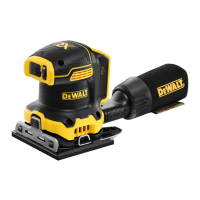13
ENGLISH
Protecting the Environment
Separate collection. Products and batteries marked
with this symbol must not be disposed of with normal
householdwaste.
Products and batteries contain materials that can
be recovered or recycled reducing the demand for raw
materials. Please recycle electrical products and batteries
according to local provisions. Further information is available at
www.2helpU.com.
Rechargeable Battery Pack
This long life battery pack must be recharged when it fails
to produce sufficient power on jobs which were easily done
before. At the end of its technical life, discard it with due care for
our environment:
• Run the battery pack down completely, then remove it from
thetool.
• Li‑Ion cells are recyclable. Take them to your dealer or a
local recycling station. The collected battery packs will be
recycled or disposed ofproperly.
Included with the unit is a dust port which fits batteries 5Ah
andunder.
Available for purchase as a service part (N684701) is a dust port
for batteries 6Ah andover.
Optional Accessories
WARNING: Since accessories, other than those offered
by
, have not been tested with this product, use
of such accessories with this tool could be hazardous.
To reduce the risk of injury, only
recommended
accessories should be used with thisproduct.
Consult your dealer for further information on the
appropriateaccessories.
Cleaning
WARNING: Blow dirt and dust out of the main housing
with dry air as often as dirt is seen collecting in and around
the air vents. Wear approved eye protection and approved
dust mask when performing thisprocedure.
WARNING: Never use solvents or other harsh chemicals
for cleaning the non‑metallic parts of the tool. These
chemicals may weaken the materials used in these parts.
Use a cloth dampened only with water and mild soap.
Never let any liquid get inside the tool; never immerse any
part of the tool into aliquid.
Lubrication
Your power tool requires no additionallubrication.
Tool Care
• Keep your machine as clean as possible by wiping with
a clean cloth and blowing through it with air after every
5hours ofuse.
• Don’t use harsh chemicals or solvents to clean the tool.
These chemicals could seriously damage theplastic.
• Avoid overloading your sander. Overloading will result in
a considerable reduction in speed and efficiency and the
unit will become hot. In this event, run sander at a “no load”
condition for a minute ortwo.
MAINTENANCE
Your power tool has been designed to operate over a long
period of time with a minimum of maintenance. Continuous
satisfactory operation depends upon proper tool care and
regularcleaning.
WARNING: To reduce the risk of serious personal
injury, turn tool off and disconnect battery pack
before making any adjustments or removing/
installing attachments or accessories. An accidental
start‑up can causeinjury.
The charger and battery pack are notserviceable.
Replacing the Sanding Pad (Fig.K)
The sanding pad
3
is designed to be a consumable part and
will occasionally need to be replaced. The sanding pad needs
replacement when signs of wear become evident. Sanding pads
are available at extra cost from your local dealer or authorized
servicecenter.
1. Holding the base firmly, remove the four screws
14
from
the bottom of thepad.
2. Remove the pad
3
.
3. Reinstall pad. Replace the four screws. Be careful not to
over‑tightenscrews.

